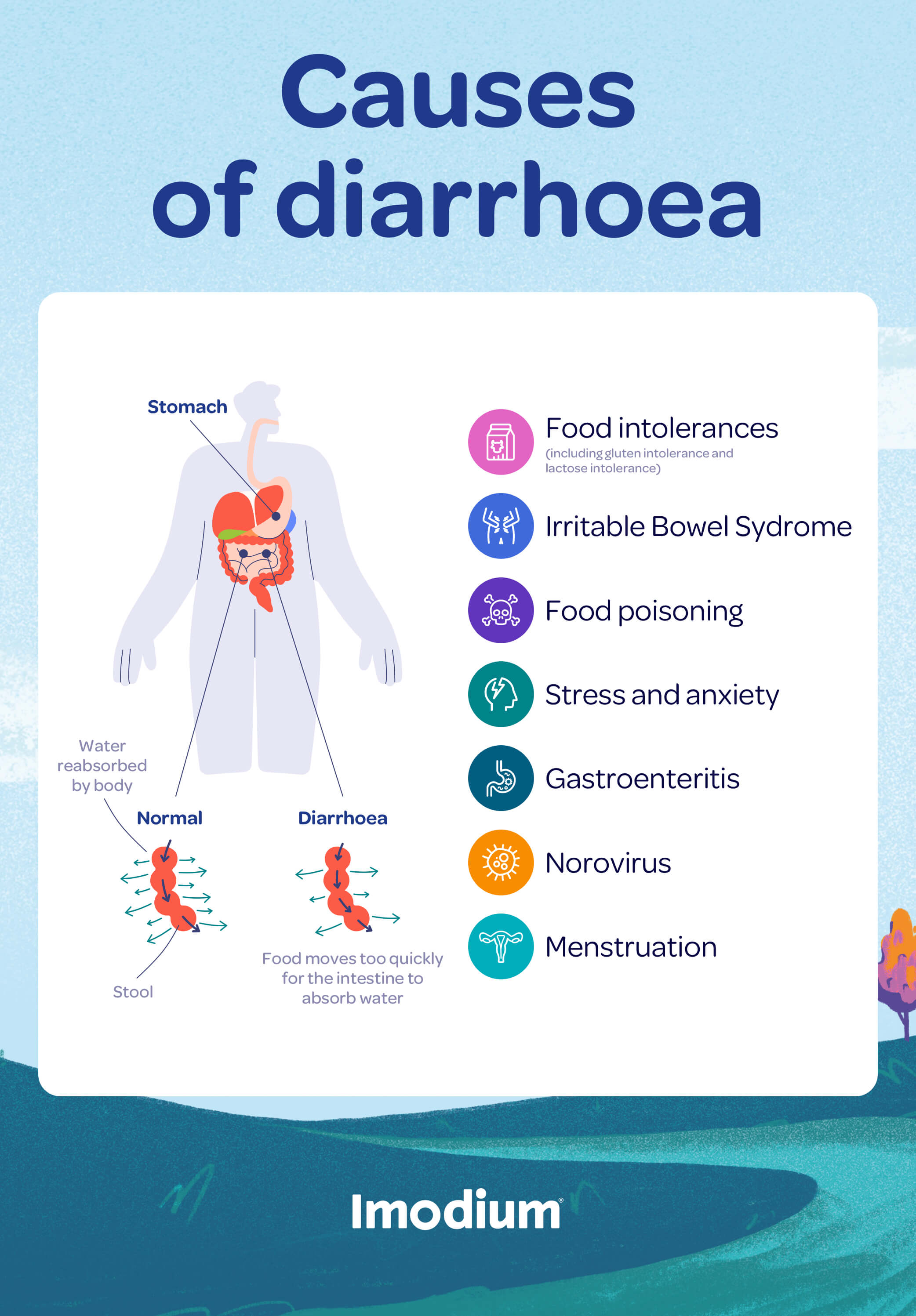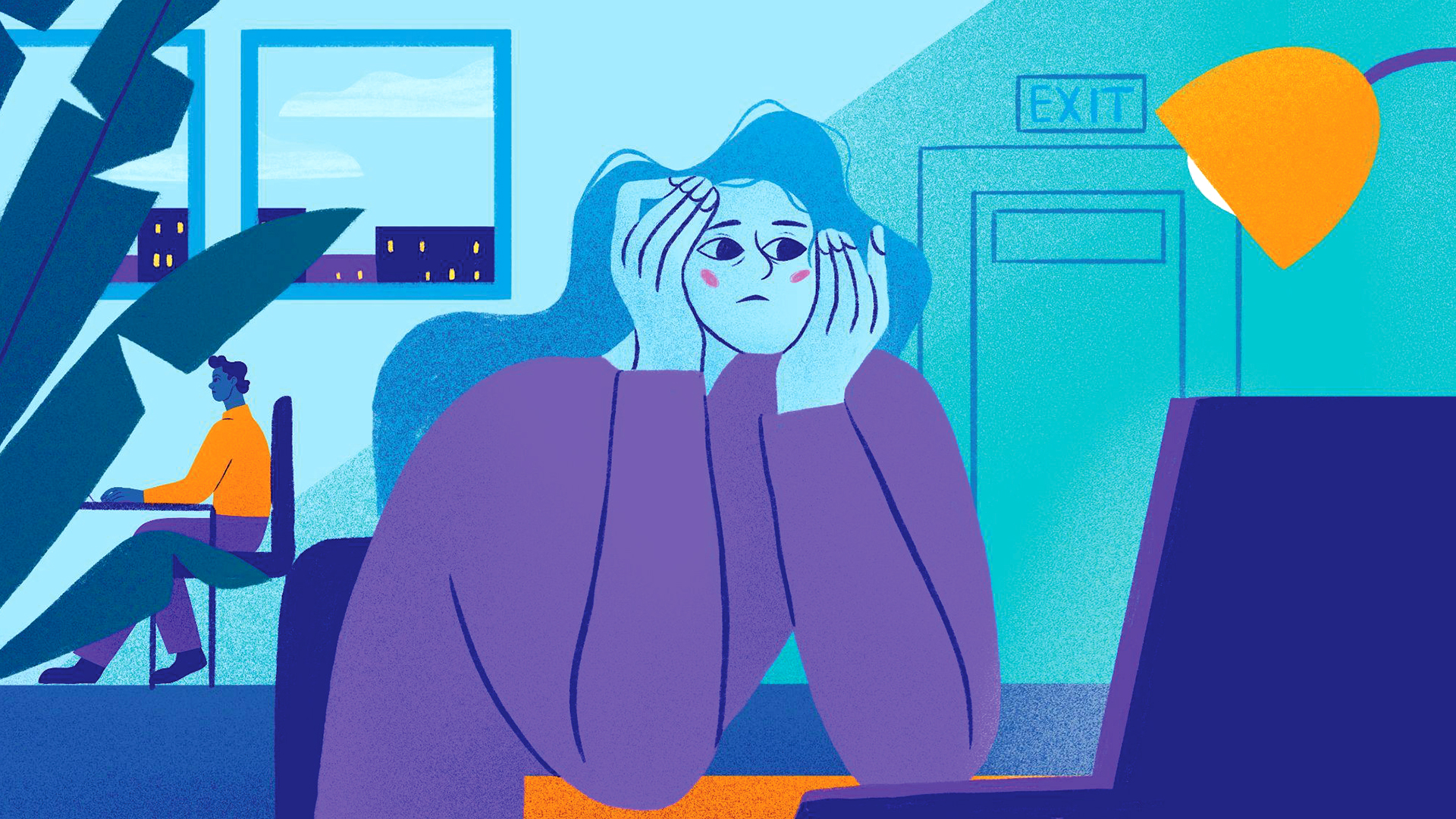Diarrhoea is a common problem that affects most of us at one time or another. Knowing what causes diarrhoea can help make it easier to treat quickly. And it could help you avoid getting it from the same source again in future.
Understanding why and when it’s best to treat diarrhoea can also help you to feel more confident in yourself. Discover the main diarrhoea causes in our guide

Diarrhoea after eating and drinking
Diarrhoea occurs due to problems with your digestive system and gut – with fluids not being absorbed properly. So, it’s little surprise that what and how you eat can trigger diarrhoea.
Everyone’s body is different, so the food and drink that bring on occasional or consistent diarrhoea after eating in one person may not have the same effect on you. Yet some foods can be more likely to cause diarrhoea than others.
Why can spicy food cause diarrhoea?
Spicy, fatty, and greasy foods can be harder to digest and trigger gut movements.
Capsaicin is found in spicy food. This can irritate your intestine, speeding up the digestive process, and preventing your colon from absorbing enough water.
Why you can get diarrhoea after drinking alcohol
You could also experience diarrhoea after drinking alcohol, as it sometimes quickens digestion. This then prevents water from being absorbed in your colon as normal.
If you haven’t eaten, the alcohol can pass through your system even faster.
What habits can cause diarrhoea after eating?
It’s not just certain types of food that can cause diarrhoea. It’s how you eat them too. For example, common eating habits that can affect your digestive system include:
Eating too fast. You’re more likely to overeat and swallow air at the same time, leading to trapped wind.
Eating large, heavy meals. Overeating makes your digestive system work harder.
Eating late at night. Your digestive system is at its least efficient at the end of the day.
Some people might experience diarrhoea straight after eating – known as postprandial diarrhoea. You may get an urgent need to use the bathroom and experience bowel pain. If you’re concerned about postprandial diarrhoea, speak to your GP as this could be a sign of another condition.
Food intolerances
If you have difficulty digesting specific foods or drinks, you may have an intolerance. A range of food intolerances can lead to symptoms of diarrhoea.
Common food intolerances that can cause diarrhoea include:
Gluten – A protein found in many types of grain, including wheat, rye, and barley.
Lactose – The body can struggle to digest lactose sugar found in milk and dairy products.
If you think you have a food intolerance or a food allergy, you should consult your GP for advice.
Food poisoning
Food poisoning and diarrhoea generally go hand in hand. In fact, food poisoning is one of the common causes of diarrhoea. You get it by ingesting bacteria and viruses from contaminated food or water. These often include:
Escherichia coli (E. coli) bacteria.
Norovirus, which we cover in more detail below.
It normally happens if you eat something that wasn’t properly cooked or stored at the right temperature, has been handled by someone with dirty hands, or was eaten beyond its ‘use by’ date.
Any kind of food can cause food poisoning, but some of the most common examples include:
Raw meat, poultry and fish.
Fruit and vegetables – either unwashed or washed in contaminated water.
Raw eggs and unpasteurised milk.
Food poisoning is one of the potential causes of gastroenteritis, which we’ll explain further below.
To reduce the risk of catching or spreading food poisoning and diarrhoea, you can:
Avoid preparing food for others.
Cook everything thoroughly.
Wash your hands thoroughly with soap and water.
Avoid drinking tap water in locations where it may be contaminated.
If you have severe symptoms of diarrhoea, blood in your stools, or a high temperature, or if symptoms persist for more than 48 hours, consult your doctor and do not use IMODIUM®.
Gastroenteritis and diarrhoea
A viral or bacterial infection of the gut usually causes gastroenteritis – which is an inflammation of your stomach or bowels. It’s sometimes known as a stomach bug or traveller’s diarrhoea and is commonly linked to food poisoning. The main gastroenteritis symptoms include diarrhoea and sickness, plus abdominal pains.
It’s very common, affecting around one in five people in the UK every year – so you’re not alone. The main gastroenteritis causes include:
Eating or drinking infected foods containing bacteria, viruses, or parasites.
Getting it directly from another person with gastroenteritis.
Touching contaminated surfaces.
Anyone can be affected by gastroenteritis. Symptoms normally appear up to a day after picking up the infection and, in most cases, last less than a week.
If you experience gastroenteritis and diarrhoea, it’s important that you:
Stay hydrated.
Have plenty of rest.
Eat small amounts of plain food if you feel hungry at all, until the symptoms pass.
Potentially speak to your pharmacist, who may recommend oral rehydration salts to help with dehydration.
You can reduce your chances of getting gastroenteritis by practising good hygiene. This includes:
Washing hands frequently with soap and water.
Disinfecting surfaces and ensuring food is prepared properly.
Flushing away any poo or vomit in the toilet and cleaning the surrounding area.
Staying off work for at least 48 hours after the gastroenteritis symptoms have passed.
When should you seek medical advice for gastroenteritis?
Some vulnerable groups – for example young children, the sick, those with long-term medical conditions and the elderly – will need medical advice if they start to experience symptoms of gastroenteritis. You should also seek medical advice if you:
Have a fever.
Have blood in your stools.
Have persistent diarrhoea after a stomach bug. If you’re considering taking IMODIUM®, seek medical advice first if your diarrhoea has lasted for more than 48 hours.
Are vomiting a lot and can’t keep fluids down.
Can’t control your bowels.
Have signs of dehydration.
Have recently travelled abroad.
Don’t have someone who can look after you at home and your symptoms are severe.Are worried about yourself or someone you care for.
IMODIUM® over-the-counter medicine is for use by people 12 years and over. If you have severe diarrhoea, blood in your stools or a fever, or if your symptoms persist for more than 48 hours, consult your doctor and do not use IMODIUM®.
Find out more about who can use IMODIUM®
Diarrhoea from norovirus
Norovirus is estimated to cause around three million cases of gastroenteritis in the UK each year. The main symptoms are diarrhoea and sickness.
Also known as the ‘winter vomiting bug’ – as it’s most common from November to early April – the name is deceptive. That’s because you can catch norovirus at any time of year. As it may lead to gastroenteritis – which in itself causes diarrhoea – many of the symptoms are the same. They include:
Sudden nausea.
Vomiting.
Diarrhoea.
Headaches.
Fever.
Aching arms and legs.
Having norovirus is an unpleasant experience, but you should start to feel better in two or three days. There’s currently no specific treatment for norovirus. And, as a viral infection, antibiotics will have no effect – although IMODIUM® can help relieve symptoms of diarrhoea.
Norovirus can spread via contaminated food/surfaces or close contact and is easily contracted by others. For this reason, if you catch norovirus, it’s advised you stay off work until at least 48 hours after the symptoms have passed to prevent further spread.
If you experience norovirus, it’s also important that you stay hydrated. Your pharmacist may recommend rehydration salts if you have signs of dehydration. If you feel like eating, try plain foods such as soup, rice, pasta, and bread. You should also get plenty of rest.
How can you help prevent the spread of diarrhoea and norovirus?
You should maintain basic hygiene and cleaning to help stop the spread of diarrhoea and norovirus. For example:
Wash your hands with soap and water (alcohol hand gels do not kill the virus).
Disinfect surfaces that could be contaminated with a bleach-based household cleaner.
Avoid eating raw unwashed food.
Wash any contaminated bedding or clothing separately (at 60C) and do not share towels or flannels.
Flush any poo or vomit in the toilet and clean the surrounding area with a bleach-based household cleaner.
Contact your GP or NHS 111 if you’re concerned or feel you need advice.
Irritable Bowel Syndrome (IBS)
Irritable bowel syndrome (IBS) affects the digestive system. It’s one of the common diarrhoea causes. But it can also cause constipation and other symptoms that come and go, lasting for varying amounts of time.
Almost one in five people suffer from IBS in the UK. And around one in three IBS sufferers experience diarrhoea symptoms. It can cause bowel pain and sensitivity when food passes through the digestive system.
What causes IBS is not yet known. Although it varies from person to person, certain factors such as stress, oversensitive nerves in the gut, or family history are believed to be linked to the causes of IBS and associated diarrhoea.
If you have IBS, certain factors can trigger symptoms, such as:
Eating and drinking specific things.
Irregular eating habits.
Stress and anxiety.
Lack of exercise.
Sadly, there is no cure for IBS yet. But changing your eating habits can help you control the symptoms and reduce the chances of getting diarrhoea.
If you think you might have IBS, it’s important you visit your GP, as they can help you manage the condition and rule out other potential causes of your symptoms.
Menstruation
Menstruation can also play a role when it comes to diarrhoea causes and symptoms. Many women experience gastrointestinal symptoms before, during, and after their period, including abdominal pain, gas, and diarrhoea.
It’s perfectly normal, as around one third of women go through gastrointestinal symptoms around the time of menstruation. And if you suffer from IBS, there’s a higher chance you may experience symptoms of diarrhoea around the time of your period.
The exact cause of diarrhoea during periods isn’t known – although many experts believe it’s due to an increased release of prostaglandin hormones before your period starts. These cause contractions so your uterus sheds its lining. But they can also lead to contractions of your intestines, resulting in diarrhoea symptoms.
There are no period-specific treatments for diarrhoea. However, using IMODIUM® will help to reduce your symptoms.
Other steps include:
Staying well hydrated to replace lost fluids.
Eating foods that are high in soluble fibre to help solidify stools.
Avoiding caffeine, as well as sugary and spicy foods.
Stress and anxiety
Stress might be one of the other causes of occasional or constant diarrhoea. Your body produces adrenaline and other chemicals when you become stressed or anxious – speeding up your heart rate and blood pressure. Stress may also make your gut muscles work faster, including those in your large intestine.
Faster digestion can mean less fluid is absorbed in your intestines. In some cases, experiencing diarrhoea could even be the first sign of your body telling you that you’re stressed and need to relax.
There can be various causes of stress and anxiety leading to diarrhoea – from being overwhelmed at work to preparing for an important exam or experiencing personal issues. Whatever is causing you to feel stressed, anxious, or nervous, cutting your stress levels could reduce your chances of getting diarrhoea symptoms.
You can try to reduce your stress levels in a range of ways. These include:
Staying active.
Speaking to friends and family.
Enjoying some ‘me time’.
Making sure you get enough sleep.


